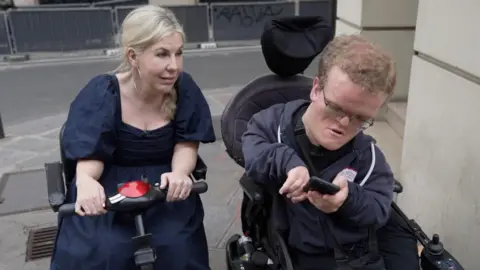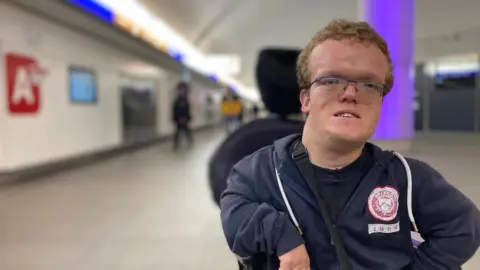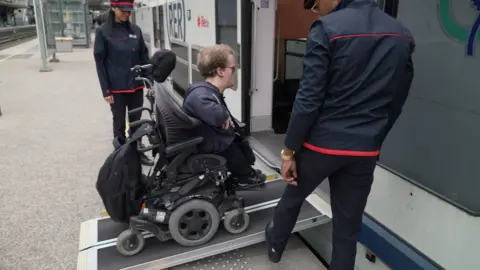Metro disabled access 'shame' for Paralympic Paris
 BBC / Nathan Standley
BBC / Nathan StandleyIt is "absolutely scandalous" that more has not been done to improve accessibility on Paris's underground trains network ahead of the Paralympics, a leading French disability charity has said.
APF France Handicap said the Metro was a "big black spot" on the city's Paralympic legacy.
The president of the International Paralympic Committee said he understood the "frustration", but pointed to "massive investment" in the city's buses.
French wheelchair users told the BBC the lack of accessibility on the Metro was a source of "shame".
Before Paris was awarded the Games in 2017, organisers had put accessibility at the centre of their bid, promising "accessible infrastructure and attitudes befitting the most visited country on Earth".
Paris is expecting 350,000 disabled fans to visit for the Games this summer.
Shuttle buses and accessible taxis are being provided to help disabled people travel around.
But Nicolas Mérille, APF's national advisor on universal accessibility, said the authorities had not made lasting changes to improve it.
"The legacy is very, very weak," he said.
"And obviously the big black spot is the Metro."
 BBC/Nathan Standley
BBC/Nathan StandleyTikTok influencer Arthur Baucheron is so popular in France that he has been selected to be a torchbearer ahead of the Games.
But Mr Baucheron, who counts French president Emmanuel Macron among his Instagram followers, finds it nearly impossible to use the Metro to get around his own capital city.
He says it is his "dream to take the Metro".
Ahead of the Games, Braille markers have been added to handrails and audio announcements have been brought in to make stations more accessible for some disabled people.
But only one of the 16 Metro lines is fully wheelchair-accessible, with lifts, step-free access and no gaps between the trains and platforms.
Mr Baucheron told BBC News it was a "shame" not to be able to access more stations, adding that he sometimes has to take three buses to see his friends in the city.
"It's really complicated to go from point A to point B without using a taxi, for example, but that's more expensive and we don't all have the money to take a taxi every time we need to go somewhere," he said.
 BBC/Nathan Standley
BBC/Nathan StandleyOut in the suburb of Maisons-Laffitte, just over 11 miles from Paris city centre, Nicolas Caffin is waiting for the 19:16 train into town.
We meet him outside the station, where two guards escort us through the ticket barriers and down to the platform, before setting up the ramp to get on to the train.
He later tells us he cannot always depend on the same level of service he gets as when he is travelling with a team from the BBC.
Mr Caffin has previously lived in England, and says he finds the tube in London more reliable, with more than a third of the Underground's 272 stations accessible for wheelchairs.
"When one line is shut, they have a substitute plan for wheelchairs," he tells us as the train heads towards Auber station, in central Paris.
"But in France, if one line is shut, you have to rely on buses. There's no choice."

We are heading to a bar on the River Seine to see some of Mr Caffin's friends. He goes into town about five times a week, for appointments and to socialise.
The bar is one stop away on Metro Line 8, which would get us there within 15 minutes of getting off the train at Auber.
But because the line is not accessible, we have to leave the station to find a bus stop, taking more than 30 minutes to reach our final destination.
We are with Mr Caffin during a national holiday in France, so the streets are quiet, but it is still a bumpy walk between bus stops, dodging the high kerbs that block access to some of the zebra crossings.
Parisian authorities have invested €125m (£107m) in the city's buses in the run-up to the Games, which are all now accessible and can accommodate two wheelchair users each.
Andrew Parsons, president of the International Paralympic Committee, told the BBC he was disappointed there had not been more improvements to the Metro in the lead-up to the Games.
But he said it would have required a change in the law and "monumental" investment to make a significant impact in the seven years of preparation.
"It made it virtually impossible," he said.
Instead, he pointed to the authorities' "massive investment" in the city's buses.
"We understand a degree of frustration not having the Metro, but we also like to highlight a positive outcome and legacy from these Games, which is to invest in the bus transport system, making it accessible," he said.
A spokesperson for the RATP Group, which operates public transport in Paris, said the Metro network is "very old and one of the densest in the world", making it difficult and costly to make widespread changes.
Mr Caffin says he has to "fight hard all the time" as a disabled person in Paris - but adds that "there is always a solution".
"It's not always easy to go out. But when you know places and you know people, there's always a way to get around it."
Additional reporting by Munaza Rafiq and Ana Lanzon.
